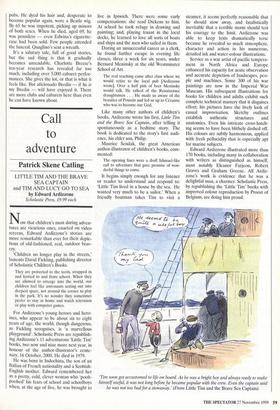Call to adventure
Patrick Skene Catling LITTLE TIM AND THE BRAVE SEA CAPTAIN and TIM AND LUCY GO TO SEA by Edward Ardizzone
Scholastic Press, £9.99 each
Now that children's most daring adven- tures are vicarious ones, enacted on video screens, Edward Ardizzone's stories are more remarkable than ever for their depic- tions of old-fashioned, real, outdoor brav- ery.
'Children no longer play in the streets,' laments David Fickling, publishing director of Scholastic Children's Books.
They are protected to the teeth, strapped in and ferried to and from school. When they are allowed to emerge into the world, our children feel like astronauts setting out into deepest space, not around the corner to play in the park. It's no wonder they sometimes prefer to stay at home and watch television or play with computer games.
For Ardizzone's young heroes and hero- ines, who appear to be about six to eight years of age, the world, though dangerous, as Pickling recognises, is 'a marvellous playground'. Scholastic Press are republish- ing Ardizzone's 11 adventurous 'Little Tim' books, two now and nine more next year, in honour of the author-illustrator's cente- nary, 16 October, 2000. He died in 1979.
He was born in Indochina, the son of an Italian of French nationality and a Scottish- English mother. Edward remembered her as a pretty, cold, clever woman who 'pooh- poohed' his fears of school and schoolboys when, at the age of five, he was brought to
live in Ipswich. There were some early compensations: she read Dickens to him. At school he took refuge in drawing and painting; and, playing truant in the local docks, he learned to love all sorts of boats and ships and the men who sailed in them.
During an unsuccessful career as a clerk, he found further escape in evening life classes, three a week for six years, under Bernard Meninsky at the old Westminster School of Art.
The real teaching came after class where we would retire to the local pub [Ardizzone wrote]. Over a half pint of beer Meninsky would talk. He talked of the Renaissance draughtsmen . . . He made us aware of the beauties of Poussin and led us up to Cezanne who was to become our God.
Like many other authors of children's books, Ardizzone wrote his first, Little Tim and the Brave Sea Captain, after telling it spontaneously as a bedtime story. The book is dedicated to the story's first audi- ence, his elder son, Philip.
Maurice Sendak, the great American author-illustrator of children's books, com- mented:
The opening lines were a droll Ishmael-like call to adventure that gave promise of won- derful things to come.
It begins simply enough for any listener or reader to understand and respond to: 'Little Tim lived in a house by the sea. He wanted very much to be a sailor.' When a friendly boatman takes Tim to visit a steamer, it seems perfectly reasonable that he should stow away, and fatalistically inevitable that a terrible storm should test his courage to the limit. Ardizzone was able to keep texts dramatically terse because he revealed so much atmosphere, character and action in his numerous, detailed ink and water-colour illustrations.
Service as a war artist of pacific tempera- ment in North Africa and Europe enhanced his capacity for acute observation and accurate depiction of landscapes, peo- ple and machines. Some 300 of his war paintings are now in the Imperial War Museum. His subsequent illustrations for books for children and adults exhibit such complete technical mastery that it disguises effort; his pictures have the lively look of casual improvisation. Sketchy outlines establish authentic structures and anatomies. Even his intricate cross-hatch- ing seems to have been blithely dashed off. His colours are subtly harmonious, applied with fresh pellucidity that is especially apt for marine subjects.
Edward Ardizzone illustrated more than 170 books, including many in collaboration with writers as distinguished as himself, most notably Eleanor Farjeon, Robert Graves and Graham Greene. All Ardiz- zone's work is evidence that he was a delightful man, a charmer. Scholastic Press, by republishing the 'Little Tim' books with improved colour reproduction by Proost of Belgium, are doing him proud.
Tim soon got accustomed to life on board. As he was a bright boy and always ready to make himself useful, it was not long before he became popular with the crew. Even the captain said he was not too bad for a stowaway.' (From Little Tim and the Brave Sea Captain).


























































































 Previous page
Previous page